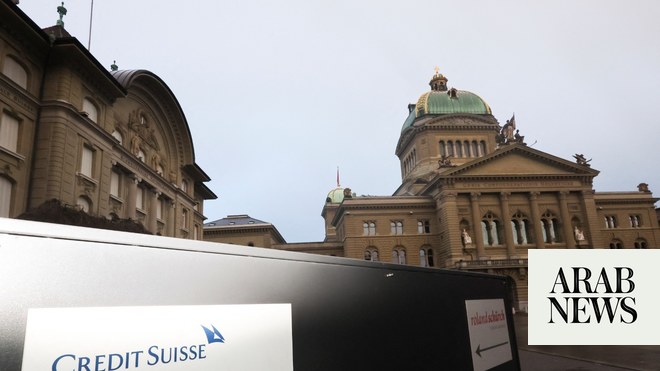
All three of the largest groups in the European parliament are demanding that the EU assess whether Switzerland should be categorised as a high-risk country for money laundering and financial crime, as reaction to the Credit Suisse leak continues to reverberate about the world.
Less than 48 hours after the Guardian and other media published an investigation into the leak as part of the Suisse secrets project, political groups representing the majority of MEPs in the European parliament support the possible blacklisting of Switzerland.
The centre-right European People’s party’s (EPP’s) economic and monetary affairs spokesperson had demanded on Monday that the European Commission reconsider whether Switzerland posed a threat to the financial integrity of the bloc.
Quick Guide
Suisse secrets
On Tuesday, spokespeople for the Socialists and Democrats (S&D) and Renew Europe, the second- and third-largest groupings representing the left and centre-left in the parliament respectively, expressed support for the move.
It could mean Switzerland being added to an EU list of rogue nations considered at high risk for money laundering, such as Iran, Syria and North Korea.
“These latest revelations show that too many of the world’s largest banks have still not learned their lesson. Banks are only too willing to accept dirty money, as long as they can pocket the fees,” said Jonás Fernández, an S&D MEP and spokesperson for economic and monetary affairs.
“Money laundering thrives on secrecy and banks being able to operate in the shadows without consequence. While we are fighting social inequalities and paying for our recovery from the pandemic, the Suisse secrets remind us of the true injustices that we are up against.”
He continued: “The EU has to look again at Switzerland’s anti-money-laundering credentials and ensure the EU’s list of high-risk countries is fit for purpose as an instrument for fighting dirty money.”
Renew Europe’s economic affairs spokesperson, Luis Garicano, said: “The Suisse secrets investigation suggests serious shortcomings in the Swiss banking system, which raise grave ethical and regulatory concerns.”
“We expect the European Commission to take these findings into consideration when it next reviews its list of high-risk third countries. The fact that the world’s criminals and despots can launder money so easily on the EU’s doorstep is unacceptable.”
The three groupings constitute 60% of the European parliament, suggesting a majority of members now favour stringent action to tackle Switzerland’s behaviour as a tax haven. However, the move would also need political support from the European Commission, as well as from individual EU member states.
Still, discussion of being added to a blacklist caused alarm in Switzerland. Responding to the debate after the leak, the Swiss Bankers Association said the country’s financial sector “has no interest in money of dubious origin. It attaches the greatest importance to the maintenance of its reputation and integrity”.
Credit Suisse said in its statement about the leak that it “strongly rejects the allegations and inferences about the bank’s purported business practices”, adding that alleged failures were largely historical and, in some instances, dated back to “a time where laws, practices and expectations of financial institutions were very different from where they are now”.
However, reaction in Washington and Geneva also points to growing anger at Switzerland over the Suisse secrets disclosures, which revealed how Credit Suisse had provided secret bank accounts for an array of high-risk clients over decades.
Ron Wyden, the chair of the US Senate committee on finance, expressed “great concern” about what he described as “Credit Suisse’s decades-long facilitation of money laundering and tax evasion”.
“These crimes are only possible when bad actors in the financial system look the other way and put profits ahead of following the law,” Wyden said in a statement. The finance committee is currently assessing whether Credit Suisse has complied with a 2014 agreement with the Department of Justice in which it promised to cease enabling tax evasion by US citizens.
The Swiss government has yet to respond to the suggestion it may be added to the EU’s money-laundering blacklist, which would require enhanced due diligence on any transaction or commercial relationship with a person or company in the country.
However, the publication of the leak, which was initially sent by an anonymous whistleblower to the German newspaper Süddeutsche Zeitung, has prompted a rare debate in Switzerland about the wisdom of the country’s banking secrecy laws.
Some have expressed outrage that the laws had prevented Swiss journalists from joining the investigation into the leak, which involved media such as the Guardian, Le Monde, New York Times and the Organized Crime and Corruption Reporting Project (OCCRP).
Swiss journalists demanded urgent reform of article 47 of the banking secrecy law, which has in recent years been broadened in a way that potentially criminalises whistleblowing and public interest journalism.
Arthur Rutishauser, the editor of Switzerland’s Tamedia, which has previously joined international investigations including the HSBC Files and Panama and Paradise papers, angrily denounced the expanded article 47 in a statement explaining why his news organisation had been prevented from joining the Suisse secrets investigation.
Article 47 has existed since the early 20th century. However, it was expanded to include third parties outside of banks in 2015, after several cases of banking insiders handing client data to foreign tax authorities, including a CD of data from HSBC Private Bank Suisse that was subsequently accessed by journalists.
On Monday, the general secretary of the European Federation of Journalists, Ricardo Gutiérrez, accused Switzerland of violating “fundamental principles of press freedom”.
“Switzerland simply does not respect European legal standards on freedom of expression and freedom of the press,” he said. “It favours the particular interest of bankers over the general interest. The necessary public debate is confiscated.
“The case law of the European court of human rights, which authorises the disclosure of confidential information as long as it serves the public interest, is not applied in Switzerland. This practice is worthy of the worst authoritarian states. It must be stopped.”











